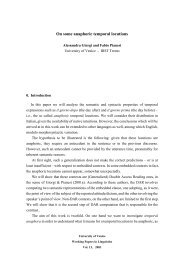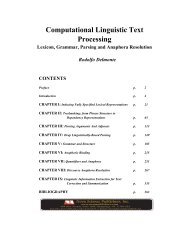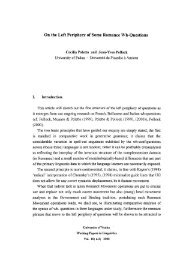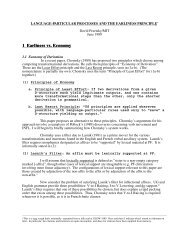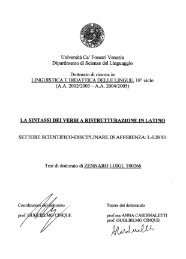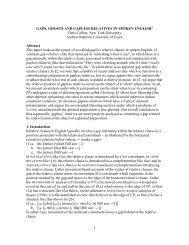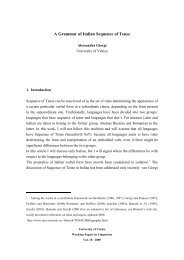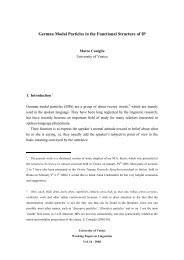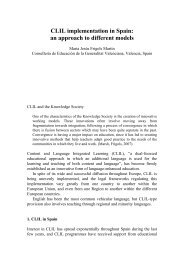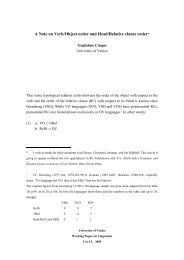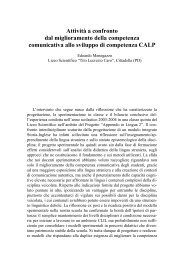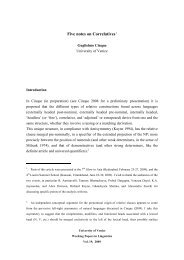Untitled - Lear
Untitled - Lear
Untitled - Lear
You also want an ePaper? Increase the reach of your titles
YUMPU automatically turns print PDFs into web optimized ePapers that Google loves.
Focus in IP: the Particle ma in Florentine<br />
Mario there stays ma taking the child to the doctor<br />
‘Mario is taking the child to the doctor.’<br />
c. i bambino (*ci) ha ma nascosto i libro sotto a i letto.<br />
the child there has ma hidden the book under to the bed<br />
‘The child has hidden the book under the bed.’<br />
a’. *Mario ha ma regalato a Giorgio un libro.<br />
b’. *Mario sta ma portando da i medico i bambino.<br />
c’. *i bambino ha ma nascosto sotto a i letto i libro.<br />
Thirdly, these sentences are appropriate in different contexts. More precisely, a<br />
sentence like (24a) can be used to contradict all the following assertions:<br />
(25) a. Mario ha regalato un libro [a suo fratello].<br />
‘Mario has given as a gift a book to his brother.’<br />
b. Mario ha regalato [un profumo a sua moglie].<br />
‘Mario has given as a gift a perfume to his wife.’<br />
c. Mario ha [comprato i giornale].<br />
‘Mario has bought the newspaper.’<br />
Answer: No. Mario ha ma [regalato [un libro [a Giorgio]]].<br />
‘No. Mario has given as a gift a book to Giorgio.’<br />
It seems that in similar ma Focus structures, it is possible to interpret as the<br />
contrasted item the most embedded constituent, or larger constituents of the predicate,<br />
up to the whole VP. However, it is not possible to interpret as the contrasted item a<br />
constituent of the VP excluding the most embedded ones:<br />
(26) a. Mario ha regalato [un disco] a Giorgio.<br />
‘Mario has given as as gift a record to Giorgio.’<br />
b. Mario ha [prestato] un libro a Giorgio.<br />
‘Mario has lent a book to Giorgio.<br />
Answer: #No. Mario ha ma [regalato [un libro [a Giorgio]]].<br />
I will take all the data presented in this section as evidence that, in sentences<br />
where ma is inserted between an auxiliary and the lexical verb, the whole VP is<br />
moved to the specifier of FocP.<br />
Ma, in these cases, must precede any adverb. I assume that these adverbs are<br />
generated in a lower position, as heads taking the whole VP as complement, and<br />
then moved with it to the specifier of FocP (see Cinque, 1999, 31):<br />
29



